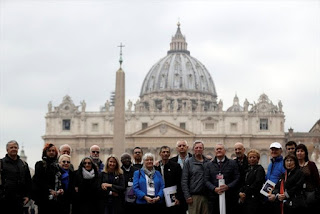"The potential for this large faith community, Roman Catholicism, to be a force for good is immense. Its very numbers, its reach, its progressive theological work, its small communities that are bringing life and doing good. But that potential is mostly squandered today.
Pope Francis, an Argentine Jesuit with a strong sense of the poor, issued a powerful letter in 2016 on the environmental crisis. Such is the disunity in the church that traditionalists, who are a mighty factor, have dismissed it, and ordinary clerics have not read it or taught from it. Never mentioned in the parishes I know.
The Pope is just back from the Arabian Peninsula, where he led mass for 135,000 people and spoke about war, violence, freedom of religion and the exclusion of immigrants. He is undoubtedly a good, often brave, person. But he is a victim of history, and is blind about women and sexuality, which are rather major topics. All that impedes him from leading the radical changes that are called for.
He is no feminist, but he has a sense of discerning the times. For him, 2018 was like a bad dream. He had a disastrous visit to Chile and almost as bad a visit to Ireland. Abuse-related reports from Mexico, Australia, the U.S., India, Germany, France, Spain and Poland were issued, and a bombshell of an expose from the state of Pennsylvania on the same subject. It reported on 300 offenders. It seems some thousands of clergy from around the world have been implicated over 40 years in the sexual abuse of minors. Just as bad has been the coverup by dozens of bishops, not reporting to the police, moving offending clerics around and closing their eyes to the obvious.
Could there be a systemic flaw here? An addiction to power? A phobia about sexuality, a privileging of the celibate over the sexually active? Could we describe the fixation on sexual prohibitions a kind of "procreationism"? That was illustrated last week by the pronouncement from an elderly Vatican cleric that in some cases hysterectomies may be permitted, but only if the uterus has ceased to be capable of carrying a child. Such absurd policy-making could only come from a group that has not one woman's voice.
The summit will "take consciousness of the seriousness of abuse" and outline procedures for bishops to follow to protect children. There was a half-hearted attempt to set up a Vatican committee including victims of clergy abuse a few years ago, but it has floundered. Decades of a terrible affliction are now exposed.
Mary E. Hunt, a leading U.S. Catholic feminist who appeared on CBC NewsNetwork this week, speaks of her deep disenchantment with institutional Catholicism. "The apparatus of the Vatican is unable to carry the gospel," she says. "The institution flames out in paroxysms of clericalism, sexism and homohatred. We women of faith seek not to clean up a mess that is not of our making, but to live a new democratic and egalitarian church open to all. Invite other leaders from other faith traditions, and secular professionals, to step forward to help our communities."
Many call a for a church that is locally based and circular: people being involved in selecting bishops, for example, a task that now in the hands of the Papal Nuncio who submits three names to the Vatican.
Meanwhile, in the Peterborough area, Rev. Rebecca Fuller of the Roman Catholic Women Priests movement, who lives in Bethany, has written to Bishop Gendron, and copied local Bishop Daniel Miehm, that the church has been the "primary carrier of the global toxic virus of misogyny, and the cure for that virus is equality." Fuller is one of some 275 Roman Catholic women priests worldwide, about 30 in Canada. They respond to invitations for the sacraments, have no parishes, and support themselves financially.
Pushing back against both structural and personal injustice may be the best we can do for now: being watchful and critical, and living out an alternative. "


No comments:
Post a Comment